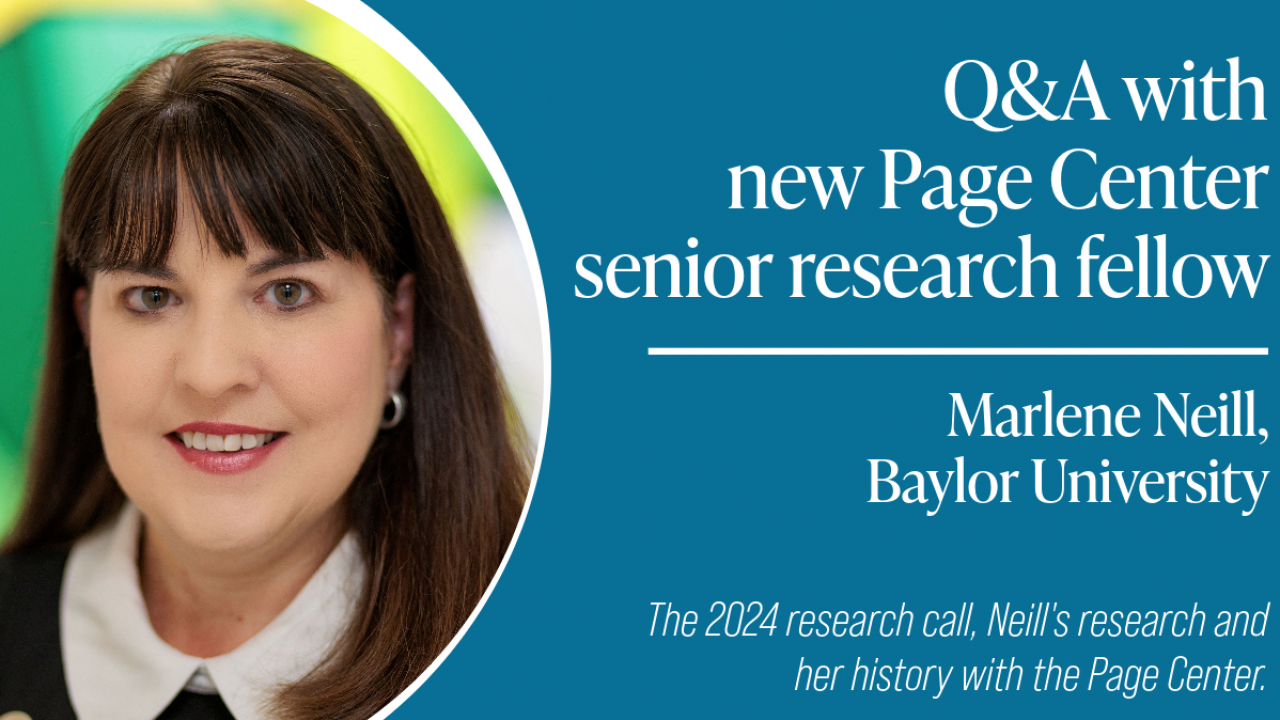September 20, 2023
New senior research fellow Marlene Neill seeks to identify gaps in professional ethics training

Marlene Neill, an associate professor at Baylor University, has a long history with the Page Center. She was first funded as a scholar in 2015 and has since led or been part of five Page Center-funded projects, including a stint as a research fellow. This past summer, Neill was named a senior research fellow, and she is leading a 2024 call for research proposals targeting professional ethics training in several areas of communication. In this Q&A, Neill discusses that call, her research and her history with the Page Center.
Can you talk about your background and your research interests that got you to where you are today?
When I was a Ph.D. student at the University of Texas - Austin, I had a chance to work with Dr. Minette Drumwright. She does research on marketing and advertising ethics, and once I got introduced to her research and read about it in one of my first courses, I determined that's exactly what I wanted to do. Mimi introduced me to her scholarship in the area of ethics. That’s where that began. I was initially concerned that it might be too narrow of a scope. I've actually found that it's a really good focus area for me, and it parallels well with my two other research interests. My three core areas that I've been working on during the last several years have been public relations leadership, internal communication and ethics. It all pairs together very well.
What about these topics made you want to pursue them? What would you say makes them so fascinating?
I'm at Baylor University, which is a Christian university. So, the ethics parallel very well with my personal faith. I've been drawn into this area because it's just a natural fit with the way I was raised and the kind of person I want to be. The way that you practice your work, no matter what profession you're in, should align with your character and the kind of person that you want to be. These particular areas resonated with me very much, and it did from the beginning.
You’ve been a scholar and a research fellow at the Page Center. Can you explain your new senior research fellow role?
There was a study done by the Commission on Public Relations Education back in 2017. It found that ethics was among the top three competencies that employers were looking for, but they weren't satisfied with what they were seeing in young professionals coming out of public relations programs – as far as knowledge, skills and abilities. In my previous study that I did as a research fellow, I focused on the essential ethics skills that are necessary in public relations. And in my prior work, I did some qualitative research, a Delphi study, and then in-depth interviews and more recently survey research. That helped me identify what core competencies are needed. The question is: What are they actually looking for? Yes, ethics, but what kind of skills and competencies?
And then you have this question of how you build these skills that are lacking. What is happening after students graduate from college? What are employers doing to continue to provide ethics training to help employees deal with emerging issues in our field right now? There's a lot of discussion about AI, for example, and what does that mean from an ethical standpoint? This is the focus of the new call. What kind of professional development training is out there for public relations professionals? For advertising professionals? For journalists? And where are there gaps?
What are some of the gaps that you’re currently aware of?
Quality of the training is definitely an issue. That's one of the things that we've brought up in the new CPRE Report, which will be coming out in November. So, a question is: How do we evaluate the quality of programs? That might be one of the areas that some of the scholars [from the research call] look into. It’s not just what programs are out there, but what is the quality like for these professional development trainings? And there's always new and emerging issues, obviously the one that's top of mind right now is AI and everyone understanding what are the ethical implications of its use? What are the proper ways of disclosing that?
Can you expand on the importance of the call and the need to identify the gaps, assess quality and evolve with new technologies?
I think we will address an area – professional development – that hasn’t seen much attention. Prior studies have focused on what's happening in higher education with college students, but this is going to be looking more at what's happening in practice and what kind of training opportunities there are. There's a lot of need for continuing education. Once you are already a working professional, what do you do to make sure that you're keeping your skills current? Some fields have continuing education credits. For those that have accreditation and in public relations specifically the APR, they have to do maintenance requirements. They're already looking for ethics training to fulfill that. And I'm sure there are other professions that have those kinds of requirements too.
As a scholar and research fellow, and now a senior research fellow, how has the Page Center helped you with your research and reaching your research goals?
The Page Center is a wonderful resource when it comes to being able to execute quality research. The cost associated with transcription services and recruiting participants for surveys can be a barrier. A lot of the studies that I've been doing would not have been possible without the Page Center’s support. It allows us to get good samples and do quality research that matters in practice. And that's basically what the value is, it allows for studies that I would not have been able to do otherwise.
